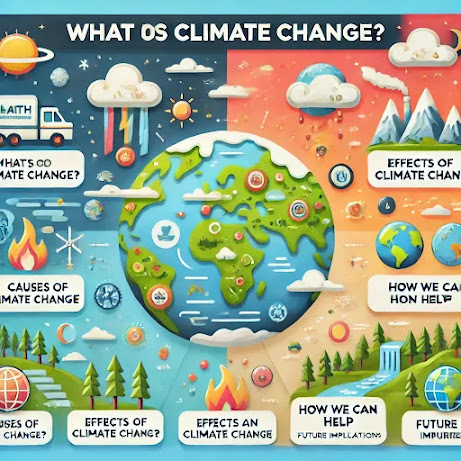Understanding
Climate Change
Climate
change is one of the most pressing issues facing our planet today. This article
aims to explain what climate change is, its causes, effects, and what we can do
to combat it. Understanding climate change is essential for students as it
affects not only our environment but also our future.
What
is Climate Change?
Climate
change refers to long-term changes in temperature, precipitation, wind
patterns, and other elements of the Earth's climate system. While the Earth's
climate has always changed over geological timescales, recent changes are
largely driven by human activities. These changes are primarily evident in
rising temperatures, shifting weather patterns, and increased frequency of extreme
weather events.
Causes
of Climate Change
1.
Greenhouse Gas Emissions
The
primary cause of recent climate change is the increase in greenhouse gases
(GHGs) in the atmosphere. GHGs, such as carbon dioxide (CO2), methane (CH4),
and nitrous oxide (N2O), trap heat from the sun, leading to the greenhouse
effect. Human activities that contribute to GHG emissions include:
- Burning Fossil Fuels: The
combustion of coal, oil, and natural gas for energy is a major source of
CO2 emissions.
- Deforestation: Trees absorb CO2;
when they are cut down, this carbon is released back into the atmosphere.
- Agriculture: Livestock produce
methane during digestion, and the use of fertilizers releases nitrous
oxide.
2. Land
Use Changes
Changes
in land use, such as urbanization and agricultural expansion, contribute to
climate change by altering the natural carbon cycle. When forests are cleared
or degraded, the land loses its ability to sequester carbon, resulting in
increased atmospheric CO2 levels.
3.
Industrial Processes
Certain
industrial processes release significant amounts of GHGs. For example, cement
production and chemical manufacturing emit CO2 and other pollutants.
Additionally, waste management practices that involve landfills contribute to
methane emissions.
Effects
of Climate Change
1. Rising
Temperatures
Global
temperatures have risen significantly over the past century. The last decade
was the warmest on record, with 2020 being one of the hottest years ever. This
increase in temperature can lead to heatwaves, affecting human health and
agriculture.
2.
Melting Ice Caps and Rising Sea Levels
As
temperatures rise, polar ice caps and glaciers are melting, contributing to
rising sea levels. This poses a threat to coastal communities, increasing the
risk of flooding and erosion.
3.
Extreme Weather Events
Climate
change is linked to an increase in the frequency and severity of extreme
weather events, including hurricanes, droughts, and wildfires. These events can
have devastating impacts on communities, economies, and ecosystems.
4.
Impacts on Biodiversity
Climate
change disrupts ecosystems and habitats, threatening species with extinction.
As environments change, many plants and animals struggle to adapt, leading to a
loss of biodiversity.
How We
Can Help
1.
Reduce, Reuse, Recycle
By
reducing waste, reusing materials, and recycling products, we can decrease the
amount of greenhouse gases released into the atmosphere.
2. Use
Renewable Energy
Transitioning
to renewable energy sources, such as solar, wind, and hydroelectric power, can significantly
reduce our carbon footprint.
3.
Conserve Water and Energy
Simple
actions like turning off lights when not in use, taking shorter showers, and
using energy-efficient appliances can contribute to conservation efforts.
4.
Advocate for Change
Students
can play an essential role in advocating for climate action by engaging in
discussions, participating in environmental organizations, and encouraging
their communities to adopt sustainable practices.
Future
Implications
The
future of our planet depends on how we address climate change today. If we fail
to take significant action, the impacts will worsen, leading to more severe
consequences for humanity and the natural world. However, through education,
advocacy, and collective action, we can work towards a more sustainable future.
Conclusion
Climate
change is a critical issue that affects us all. By understanding its causes and
effects, students can become informed advocates for the environment. Taking
action, no matter how small, can contribute to the larger effort to combat
climate change and protect our planet for future generations.


No comments:
Post a Comment
Please keep your views respectful and not include any promotional comments. Such comments will be removed and your IP will be blocked for future purpose.